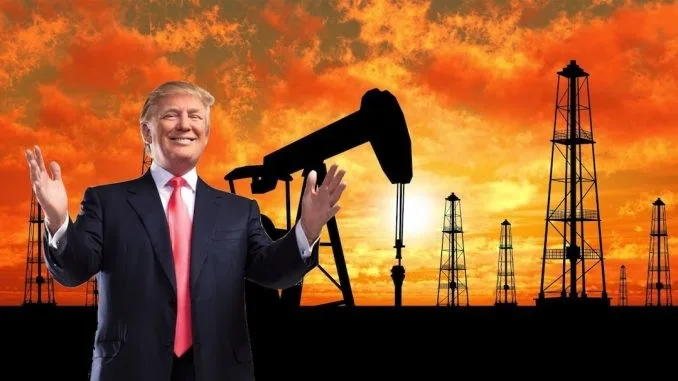Trump’s Victory Pushes Oil Prices Up Amid Market Uncertainty
Oil prices have seen a marked increase following Donald Trump’s win in the 2024 U.S. presidential election. Brent crude rose to $75.57 per barrel, and U.S. West Texas Intermediate (WTI) climbed to $72.23, as markets react to anticipated shifts in energy policy under the new administration.
Trump’s promises to support domestic production, reduce regulations, and potentially enforce stricter sanctions on countries like Iran and Venezuela have left the oil market with a mix of optimism and caution.
Join our WhatsApp ChannelRegulatory Changes and the Impact on Oil Prices
U.S. oil producers anticipate a friendlier regulatory environment under Trump, which could encourage more domestic production. Increased drilling would typically lead to greater supply and lower oil prices.
However, Goldman Sachs analysts highlight the unpredictability of this impact, explaining that while short-term regulations may increase supply, sanctions could tighten global availability.
“Conceptually, the impact of a potential second Trump term on oil prices is ambiguous,” Goldman Sachs commodities analysts noted, indicating potential “downside risk to Iran oil supply” and an “upside price risk” if sanctions are enforced. Yet they cautioned that a prolonged trade war could reduce global demand, affecting oil prices over the long term.
Increased Sanctions Could Impact Oil Prices
During his first term, Trump imposed heavy sanctions on Iranian and Venezuelan oil, significantly reducing the availability of their crude in the global market. The re-election has fuelled concerns over a potential revival of these sanctions, which could constrain supply and drive prices higher.
Iranian oil production currently stands at around 3.5 million barrels per day, with exports at 1.8 million. If Trump’s policy restricts Iranian exports, experts estimate that a million barrels per day could disappear from the market.
“There’s an enormous amount of sanctioned barrels in the market right now,” said Amrita Sen, founder of London-based Energy Aspects. She warned that U.S. sanctions could cut Iranian oil exports back down to 400,000 barrels a day, as seen during Trump’s previous term. If Venezuelan barrels face similar restrictions, global supply could further tighten, pushing oil prices higher.
READ ALSO: Crude Oil production: NCDMB Advocates Annual FID Week
Domestic Production and Oil Prices: A Mixed Outlook
Trump’s policy toward domestic energy production could see the U.S. increase oil output. As the world’s largest oil producer, the U.S. currently supplies 22% of global crude, with Saudi Arabia following at 11%. Trump has previously expressed confidence in U.S. energy dominance, joking with his campaign colleague Robert F. Kennedy Jr., “Bobby, stay away from the oil, stay away from the liquid gold! We have more than Saudi Arabia and Russia.” A boost in domestic production could mean lower prices as supply grows.
Yet, increased production has its limits. Cole Smead, CEO of Smead Capital, highlighted that most U.S. producers would struggle with prices falling below $70 per barrel. He stated that a push for expanded drilling might not yield the expected returns, saying, “If the Trump administration opens up federal leases for oil and gas, federal lands would get 25 percent per barrel of revenues. The only thing that will cause ‘drill, baby, drill’ to happen is higher oil prices.”
Global Economic Effects and Demand Concerns for Oil Prices
The uncertainty surrounding global trade policies and Trump’s potential approach to China adds another layer of complexity. Escalating trade tensions could impact global economic growth and, in turn, reduce oil demand. Goldman Sachs analysts warned that global GDP growth could suffer, ultimately affecting demand and putting pressure on oil prices.
Sen added that the renewed sanctions could, however, outweigh trade risks, leaving the market to balance potential supply constraints with lowered demand forecasts. “While some expect a drop in prices, sanctions may keep oil prices steady or even raise them,” she said.
Industry Experts Divided on Long-Term Oil Prices
Industry insiders like Patrick Pouyanne, CEO of TotalEnergies, believe that the U.S. will need to maintain its competitive edge in energy production, regardless of the administration. “The U.S. has a clear competitive advantage on energy compared to the rest of the world,” he remarked.
Ultimately, the path forward for oil prices remains uncertain. Analysts are divided on whether Trump’s policies will stabilize or disrupt the market. With both production increases and potential sanctions in play, oil prices may face volatility in the coming months. “The price of goods that are produced is the number one factor in America’s policies,” concluded Smead. “If you are not the low-cost producer, you should be scared.”
The industry watches closely as Trump’s energy agenda takes shape, with oil prices reacting to every policy shift, reflecting the dynamic balance between supply, demand, and regulatory control.
Emmanuel Ochayi is a journalist. He is a graduate of the University of Lagos, School of first choice and the nations pride. Emmanuel is keen on exploring writing angles in different areas, including Business, climate change, politics, Education, and others.
- Emmanuel Ochayihttps://www.primebusiness.africa/author/ochayi/
- Emmanuel Ochayihttps://www.primebusiness.africa/author/ochayi/
- Emmanuel Ochayihttps://www.primebusiness.africa/author/ochayi/
- Emmanuel Ochayihttps://www.primebusiness.africa/author/ochayi/


















Follow Us